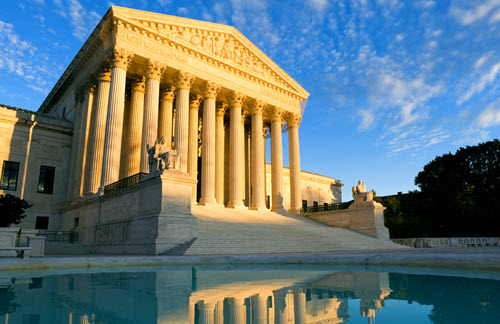
By: Racheal M. White Hawk | Associate | racheal.whitehawk@procopio.com
Theodore J. Griswold | Partner | ted.griswold@procopio.com
Last week, federal district court Judge Reed O’Connor in Texas dealt a blow to decades of efforts to preserve Native American families by finding that the Indian Child Welfare Act of 1978 (“ICWA”) is unconstitutional in Brackeen v. Zinke, No. 4:17-cv-00868-O (N.D. Tex. Oct. 4, 2018). Selectively ignoring long-held Supreme Court Indian law precedent, the ruling is the first in the country to find that ICWA in its entirety is unconstitutional. The ruling raises serious questions about whether it will survive appellate review and what impact it will have on Indian communities.
The Brackeen case involves three Indian children in need of foster care and adoptive placement. As Indian children, the federal ICWA takes precedence in their foster care and adoptive placement proceedings in state court, requiring preferences for placing Indian adoptees in Indian homes to preserve Indian families and tribal cultures. Congress enacted ICWA in 1978 with its placement preferences in response to the Indian adoption era, a period of approximately thirty years in which 25 to 35% of Indian children were forcibly removed from their homes and 90% were placed in non-Indian homes resulting in broken families and cultural depletion in many tribal communities.
The Brackeen case was brought by individual non-Indian parents seeking to adopt Indian children, who were joined by three state governments (Texas, Louisiana, and Indiana) and supported by anti-ICWA groups that filed numerous similar suits throughout the country, but had not prevailed in striking down ICWA. The defendants included the federal government, with several Tribes intervening in the proceedings.
The district court first held that ICWA’s preference to place Indian children in Indian homes is race-based, and under “strict scrutiny” review, the law is not narrowly-tailored to further a compelling government interest. The district court held that ICWA, therefore, violates the equal protection component of the Fifth Amendment’s Due Process Clause. This holding ignores well-established Supreme Court precedent regarding American Indian tribes as political entities, not racial groups, to which the federal government owes a unique trust responsibility. See Morton v. Mancari, 417 U.S. 535, 554–55 (1974). Moreover, just last year, the Supreme Court declined to review the argument that ICWA is a race-based law, resulting in the upholding of an Arizona Court of Appeals’ decision that ICWA is not based on race. See S.S. v. Stephanie H., 388 P.3d 569, 576 (Ariz. Ct. App. 2017), cert. denied sub nom. S.S. v. Colorado River Indian Tribes, 138 S. Ct. 380 (2017)).
The Texas district court then held that the federal government unlawfully requires states to commit resources to enforcing ICWA, in violation of the Tenth Amendment’s prohibition on commandeering state legislatures. The district court also briefly addressed the plaintiffs’ other arguments, holding that Congress unlawfully delegated legislative power to tribes under ICWA, in violation of Article I of the Constitution, and that the Indian Commerce Clause does not constitutionally save ICWA. The court also found the ICWA regulations invalid.
Although the decision in Brackeen purports to strike down ICWA and its regulations as unconstitutional, the ruling only affects the parties in the case. The intervenor tribes are seeking a stay, as well as appellate review of the decision. Numerous organizations and state governments supporting tribes and ICWA have filed amicus briefs in the case and have expressed desire to continue supporting the case on appeal. When appealed, the case will progress to the U.S. Court of Appeals for the Fifth Circuit.
The plaintiffs in the Brackeen case are supported by organizations that unsuccessfully presented similar arguments to the U.S. Court of Appeals for the Ninth Circuit. See Carter v. Tahsuda, No. 17-15839, 2018 WL 3720025 (9th Cir. Aug. 6, 2018). The organizations simultaneously targeted a different venue–the District Court for the Northern District of Texas–hoping for a better result, which they received. (Judge O’Connor, a GOP appointee, has been a target judge for conservative advocates contesting national issues such as transgender rights, DACA, and the Affordable Care Act.) Although the Ninth Circuit did not weigh in on the merits of the arguments in the Carter case, if the Fifth Circuit were to hold ICWA unconstitutional, differing outcomes of circuit cases could influence the Supreme Court to grant review on the constitutionality of ICWA. The recent addition of Brett Kavanaugh to the Supreme Court may not bode well for tribes if the Court were to review ICWA’s constitutionality. Kavanaugh authored an Amicus Brief in Rice v. Cayetano, 528 U.S. 495 (2000), on behalf of a conservative think tank in which he argued that Native Hawaiians were racial groups, not political entities. The Texas district court in Brackeen cited Rice in holding ICWA unconstitutional as a race-based law. There is concern that Kavanaugh may view American Indian tribes in the same way, i.e., as racial groups, not political entities. For now, the Brackeen case only affects the parties involved.
If the Texas ruling is upheld, it could have severe ramifications in federal Indian law, potentially invalidating numerous federal laws that Congress has enacted based on its special trust responsibility to tribes. Tribes, other entities, or individuals concerned about this ruling and interested in supporting ICWA can show their support in several ways. One way to support ICWA is to vote for and financially support government officials in upcoming elections who will support ICWA. Another way is to support, financially or otherwise, organizations currently working to support the tenets of ICWA, such as the National Indian Child Welfare Association, the Native American Rights Fund, the Association on American Indian Affairs, and the National Congress of American Indians. If you or your family members have been affected by pre-ICWA removal policies, contact the Partnership for Native Children, who can help you share your story so that others will better understand why ICWA is such an important law and what is at stake with the Brackeen decision.
Procopio will continue to monitor the Brackeen case closely as it progresses in the courts.
 Racheal M. White Hawk (Rosebud Sioux Tribe) is an Associate and member of Procopio’s Native American Law Practice Group. Racheal is a member of the Arizona Bar and is awaiting results from the California Bar. Connect with Racheal at racheal.whitehawk@procopio.com and 619.906.5654.
Racheal M. White Hawk (Rosebud Sioux Tribe) is an Associate and member of Procopio’s Native American Law Practice Group. Racheal is a member of the Arizona Bar and is awaiting results from the California Bar. Connect with Racheal at racheal.whitehawk@procopio.com and 619.906.5654.
 Ted Griswold is head of Procopio’s Native American Law Practice Group and primary editor for the Blogging Circle. Connect with Ted at ted.griswold@procopio.com and 619.515.3277.
Ted Griswold is head of Procopio’s Native American Law Practice Group and primary editor for the Blogging Circle. Connect with Ted at ted.griswold@procopio.com and 619.515.3277.


 It was our honor at Procopio to co-sponsor the Opening Night at the California’s American Indian and Indigenous Film Festival at Pechanga Casino and Resort. Thank you to Sandy White Hawk and Director Drew Nicholas for sharing the award-winning film “
It was our honor at Procopio to co-sponsor the Opening Night at the California’s American Indian and Indigenous Film Festival at Pechanga Casino and Resort. Thank you to Sandy White Hawk and Director Drew Nicholas for sharing the award-winning film “

 Ted Griswold
Ted Griswold